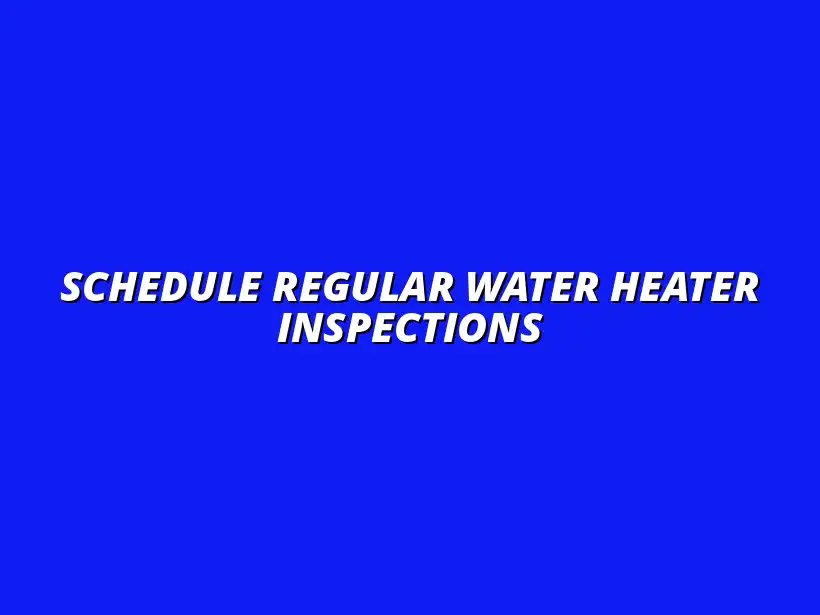
Schedule Regular Water Heater Inspections
Understanding the Importance of Regular Water Heater Inspections
Regular water heater inspections are crucial for maintaining the efficiency and longevity of your heating system. Just like a car, your water heater needs routine check-ups to ensure it operates smoothly. By having these inspections, you can identify potential problems before they become serious issues. For more advice on maintaining other key areas of your home plumbing, check out these essential bathroom plumbing checks.
When I think about my own water heater, I realize that neglecting inspections is like ignoring a check engine light. It's easy to overlook, but doing so can lead to higher energy bills and unexpected breakdowns. Prioritizing inspections means saving money in the long run and enjoying consistent hot water whenever you need it!
Why Regular Inspections Matter for Your Water Heater's Longevity
When you commit to regular inspections, you are actively contributing to the lifespan of your water heater. A well-maintained unit can last up to 15 years or longer, while a neglected one may fail much sooner. This longevity can significantly impact your budget and reduce the hassle of unexpected replacements. Learn how to maintain your water heater efficiently for optimal performance.
Here are the primary reasons why inspections are beneficial:
- Early Detection: Spot problems before they escalate.
- Efficiency: Ensure the heater runs effectively, lowering energy costs.
- Safety: Prevent potential hazards like leaks or explosions.
Key Benefits of Scheduling Routine Inspections for Water Heaters
Scheduling inspections carries numerous advantages. Not only do they enhance the performance of your water heater, but they also provide peace of mind. Knowing that your heating system is in good shape allows you to focus on other aspects of home maintenance. Regular inspections can also help prevent costly plumbing leaks, as detailed in this article on preventing plumbing leaks.
Some key benefits include:
- Extended Lifespan: Regular care can help your unit last longer.
- Improved Performance: Efficient heating leads to better hot water supply.
- Cost Savings: Avoid expensive repairs through preventative maintenance.
Identifying the Right Time for Water Heater Inspections
Understanding when to schedule water heater inspections is just as important as recognizing their value. Timing can help catch issues early, preventing costly repairs or replacements down the line. By knowing the signs that indicate an inspection is needed, you can take action promptly. For instance, understanding the causes and fixes for a water heater leak is crucial.
Proactively addressing potential issues ensures your water heater operates efficiently and safely. So, let’s explore the signs that will help you identify the right time for an inspection!
Signs Indicating When to Schedule an Inspection
There are several clear signs that suggest it’s time for a water heater inspection. Recognizing these can save you from larger headaches in the future. Keep an eye out for the following indicators:
- Unusual noises coming from the unit.
- Inconsistent water temperature.
- Leaks or moisture around the heater.
- Discolored or foul-smelling water.
If you notice any of these signs, it’s wise to schedule an inspection as soon as possible. The sooner you address these issues, the better your chances of avoiding a complete system failure! For yearly maintenance tips, consult this guide on annual water heater inspection tips.
Recommended Frequency for Water Heater Inspections
So, how often should you have your water heater inspected? General recommendations suggest scheduling these inspections at least once a year. However, the frequency may vary based on several factors, including the age and type of your unit. Don't forget the importance of regular water pipe cleaning, as described in this article on regular water pipe cleaning tips.
Here’s a quick guide to help you determine your inspection schedule:
- **Standard Units:** Inspect annually.
- **Older Units (10+ years):** Consider semi-annual inspections.
- **Heavily Used Units:** Monthly checks may be beneficial.
By sticking to a regular schedule, you can ensure your water heater remains in optimal condition and minimizes the risk of unexpected issues!
Maximizing the Effectiveness of Your Water Heater Inspections
To really get the most out of your water heater inspections, it's essential to prepare your system ahead of time. This means ensuring that the area around your water heater is clear and accessible. When your technician can easily reach your heater, the inspection can be more thorough and efficient, ultimately leading to better results!
Additionally, I recommend taking a moment to jot down any issues or concerns you’ve noticed. This will give the technician a better understanding of what to look for during the inspection. Plus, it helps you stay informed about your water heater’s health! If you need a plumber in the Birmingham area, consider checking out PlumbProCare's services in Billesley, Birmingham.
Preparing Your Water Heater for an Inspection
Here are some steps you can take to prepare your water heater for an inspection:
- Clear the area around the water heater to ensure easy access.
- Check if there are any visible leaks or odd sounds coming from the unit.
- Make sure the temperature settings are appropriate, usually around 120°F.
- Gather any previous inspection records to provide to the technician.
By completing these steps, you’re not only making the inspection process smoother, but you’re also potentially catching small issues before they become big problems. Remember, being proactive can save you both time and money down the road!
Common Issues Identified During Inspections and Their Solutions
During inspections, technicians find a variety of common issues. Addressing these early can prolong your water heater’s life and improve its efficiency. Here are some frequent problems and potential solutions:
- Rusty water: This could signify corrosion inside the tank. Flushing the tank and possibly replacing the anode rod may help.
- Strange noises: Banging or popping sounds can indicate sediment buildup. Flushing the unit is typically recommended.
- Leaks: Any water pooling around the unit is a sign of trouble. Sealing connections or replacing parts may be necessary.
- Inadequate hot water: This might mean the heater isn't set correctly or needs maintenance. Adjusting the thermostat or inspecting the heating elements might be needed.
Addressing these common issues promptly can enhance your water heater’s efficiency. A little attention now can prevent larger, more costly repairs in the future!
Addressing Common Questions About Water Heater Inspections
As a homeowner, you may have several questions about what to expect during a water heater inspection. Knowing the answers can ease your mind and prepare you for the process. Let’s dive into some of the most common questions!
What Should I Expect During a Water Heater Inspection?
When you schedule an inspection, it's good to know what will happen. Here’s what typically takes place during the inspection:
- Visual inspection of the water heater for leaks, rust, and overall condition.
- Testing the temperature and pressure relief valve to ensure it functions properly.
- Flushing the tank to remove sediment buildup, if necessary.
- Checking the anode rod and replacing it if it's heavily corroded.
Your technician will discuss any findings with you and suggest recommendations for maintenance or repairs. Being informed will help you make better decisions about your water heater!
How Much Do Water Heater Inspections Typically Cost?
The cost of a water heater inspection can vary based on several factors. Generally, you might expect to pay between $80 and $150 for a routine inspection. However, knowing what influences these costs can help you budget better!
Factors That Influence Inspection Costs
Several elements can affect the price of inspections, including:
- The type of water heater: Gas, electric, or tankless models may have different inspection rates.
- Your location: Prices can vary based on regional labor costs.
- The complexity of the inspection: If your unit has multiple features or issues, it could take longer to inspect.
- Additional services: Flushing the tank or making minor repairs can raise the overall cost.
Understanding these factors can help you find the best service for your needs while staying within your budget!
Establishing a Long-Term Maintenance Strategy for Water Heaters
To keep your water heater running smoothly, establishing a long-term maintenance strategy is vital. This involves integrating inspections with other home maintenance tasks. By doing so, you are ensuring your entire home system functions effectively!
Integrating Inspections with Other Home Maintenance Tasks
Consider combining your water heater inspections with other routine home maintenance. Some tasks to align include:
- Regular smoke detector checks.
- HVAC system servicing.
- Cleaning gutters and downspouts.
- Checking and replacing air filters.
By scheduling these tasks together, you can save time and often reduce service costs. It’s all about efficiency and making life easier for you!
Documenting Inspection Findings for Future Reference
Keeping a record of each inspection is crucial. Take note of what the technician did, what issues were found, and any recommendations they made. This documentation can be helpful for future inspections and repairs.
Here’s how to effectively document your findings:
- Create a dedicated folder for inspection records.
- Use a digital tool or app to track dates and notes.
- Include photographs of any significant issues.
Maintaining these records ensures you have a comprehensive history of your water heater’s maintenance, aiding in any future troubleshooting.
Encouraging Proactive Maintenance for Water Heater Performance
Promoting awareness of the benefits of regular water heater inspections among homeowners is essential. Many people don't realize how much routine checks can save them in the long run!
Promoting Awareness of Water Heater Inspection Benefits Among Homeowners
To encourage others, consider sharing the following benefits:
- Improved energy efficiency leading to lower utility bills.
- Extended lifespan of the water heater.
- Reduced risk of unexpected breakdowns.
- Enhanced safety by preventing leaks and other hazards.
By spreading the word, we can help more homeowners understand the importance of proactive maintenance for their water heaters!
Final Thoughts on Scheduling Regular Inspections for Your Water Heater
In conclusion, scheduling regular inspections for your water heater is a smart investment in your home. By maximizing the effectiveness of these inspections and being proactive, you can improve your water heater’s performance and longevity. Remember, it’s not just about fixing problems; it’s about preventing them!
Let’s take those smart steps together to ensure our homes are safe, efficient, and comfortable. Happy home maintenance!




